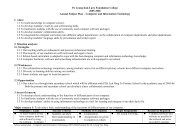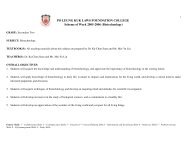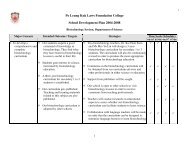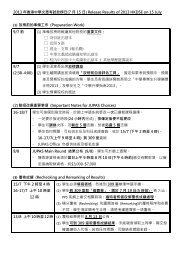æ´»å¨â§æâ§ç©ºé空é2012 1 - Po Leung Kuk Laws Foundation College
æ´»å¨â§æâ§ç©ºé空é2012 1 - Po Leung Kuk Laws Foundation College
æ´»å¨â§æâ§ç©ºé空é2012 1 - Po Leung Kuk Laws Foundation College
Create successful ePaper yourself
Turn your PDF publications into a flip-book with our unique Google optimized e-Paper software.
How I LIVE with my Dimension<br />
Environmental Problems Cause<br />
Shrinkage of Food<br />
1J Abbass Gary<br />
I have read an article about the shrinkage<br />
of food. Nowadays, people produce a lot of<br />
pollutions, especially air pollution, water<br />
pollution and land waste. Air pollution causes<br />
greenhouse effect and this leads to global<br />
warming. When people produce more and more<br />
greenhouse gases, the temperature gets higher<br />
and higher. As a result, the weather becomes<br />
unusual and natural disasters appear more often.<br />
Droughts caused by global warming threaten<br />
the growth of plants. As animals need to<br />
adapt to the high temperature and diminishing<br />
grassland, they decrease their size and number.<br />
The effect on humans is profound.<br />
The shrinkage of animals and plants would<br />
disrupt the operation of the food chain. As<br />
being at the top of the food chain, the shrinkage<br />
of animals and plants would affect our major<br />
food supply. When the world population keeps<br />
on rising, humans will soon compete for food<br />
due to the shortage.<br />
Additionally, if animals and plants reduce in<br />
size, then humans will eat less in quantity, the<br />
ratio of nutrients absorbed will also decrease.<br />
For example, if the main material that our body<br />
uses to produce haemoglobin decreases, the<br />
amount of haemoglobin will fall and it may<br />
lead to anaemia.<br />
Species evolve to adapt to the environment.<br />
However, if the changes are drastic or rapid, as<br />
appears to be the case of global warming, the<br />
adaptation becomes very difficult and extinction<br />
may happen. It affects the biodiversity of our<br />
planet, where species rely on each other to<br />
coexist in balance. If one of the species, for<br />
example bees, disappears, then most of the<br />
plants cannot survive. It is because bees help<br />
pollenate the plants. Therefore if bees vanish,<br />
then the relationship between the bees and<br />
plants will disappear. So plants will eventually<br />
die out.<br />
Ecological balance ensures a stable supply<br />
of precious resources. It is a crucial pillar to<br />
human. Undermining ecological imbalances<br />
should be a priority for humans now. People<br />
should reduce carbon dioxide emissions. It<br />
takes time to see the effects, and they are hard<br />
to predict. Combating the crises triggered by<br />
global warming has already become a pressing<br />
issue.<br />
Local schools should reduce the consumption<br />
74<br />
Dimension 2012






![Page 1 Page 2 Page 3 ããä¸çæ¯å¹³çãTheWorIdiSf]at)ã ä½è
湯馬 æ¯ ...](https://img.yumpu.com/49083939/1/184x260/page-1-page-2-page-3-aaacaeacatheworidisfata-a-1-2-eaee-ae-.jpg?quality=85)









